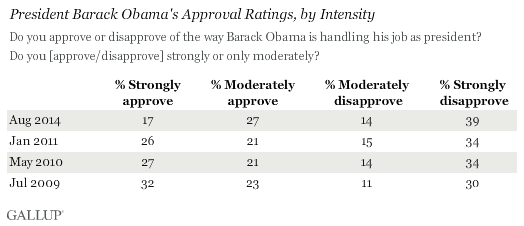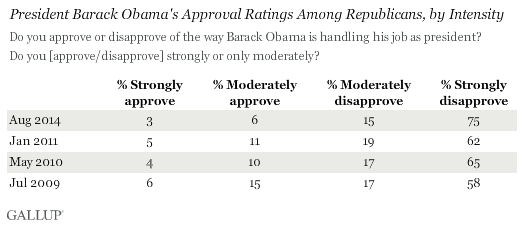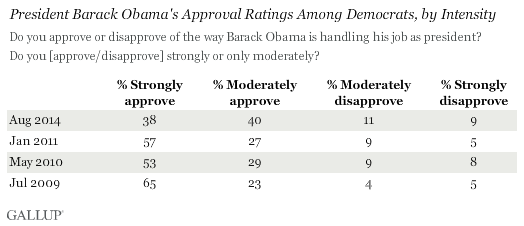WASHINGTON, D.C. -- Americans are more than twice as likely to say they "strongly disapprove" (39%) of President Barack Obama's job performance as they are to say they "strongly approve" (17%). The percentage of Americans who strongly disapprove of Obama has increased over time, while the percentage who strongly approve has dropped by almost half.

In the first year of Obama's presidency, the percentages of Americans who had strong views about the job he was doing were essentially tied, but the strongly negative responses now significantly outweigh the strongly positive ones. The largest segment of Americans today, 39%, strongly disapprove of Obama's job performance, while 14% moderately disapprove. Another 27% moderately approve, while 17% strongly approve.
Strong disapproval of the president's job performance has been within 30% to 39% the four times Gallup has asked the question -- in 2009, 2010, 2011, and now this year -- but has risen by five percentage points since 2011, and by nine points since the first month Obama was in office. At the same time, strong approval has fallen by nine points in the last three years, and by 15 points since January 2009.
The overall changes reflect larger shifts in opinion within the president's own Democratic base, as well as among Republicans, whose already widespread strong disapproval of Obama has expanded.
Three in Four Republicans Strongly Disapprove of Obama's Job Performance
Since 2009, a majority of Republicans have strongly disapproved of Obama's performance, ranging between 58% and 75%. Gallup has not asked this intensity question frequently, but in its recent Aug. 7-10 poll, this percentage jumped 13 points from the January 2011 measure, suggesting that extreme dissatisfaction among the president's opposing party is higher than it has ever been.

Notably, Republicans are even more likely to say they strongly disapprove of Obama now than in 2010, a year when a tide of anti-Obama sentiments led to major Democratic losses in the House and Senate in that year's midterm election. Part of that increase may be attributable to the passage of time, in that Republicans are simply more solid in their views of Obama six years into his presidency than two years in. But those strong negative views of Obama could boost Republican turnout this fall when the Democratic majority in the Senate is in peril.
Though Republicans who moderately or strongly approve of Obama have always been in the minority, a sizable one in five (21%) approved of the president in 2009. Today, however, this percentage is less than half of what it was then, with only 9% of Republicans saying they approve -- moderately or strongly -- of Obama's performance.
Enthusiastic Support for Obama Among Democrats Wanes
Democrats are also less likely to approve of Obama now than during his honeymoon period in 2009 (78% vs. 88%, respectively). Additionally, whereas Democrats were nearly three times as likely to strongly approve as moderately approve of Obama in 2009, the ratio is now about 1-to-1.

Margin Widens Between Independents' Strong Approval, Disapproval
Compared with Democrats and Republicans, independents have been more consistent in the intensity of their views of Obama, particularly among independents who disapprove of the president. Currently, 39% of independents say they strongly disapprove of Obama's performance -- a slight increase from the 2009 through 2011 polls, when one in three (33% to 34%) said the same.

In previous years, one in five or more independents (19% to 23%) strongly approved of the president's performance. In 2014, however, the percentage of independents who strongly approve has shrunken to 11%.
Bottom Line
It remains to be seen whether strong disapproval of Obama's performance will continue to grow during his final two years in office, or if it will ease once the heightened partisanship that midterms can bring ends, and the 2016 election season begins.
Clearly, the trajectory in his overall ratings will determine much of that. But if Americans' overall opinion of him grows more positive, his strong disapproval numbers may fall. More generally, the intensity of opinions about the president could affect both the forthcoming midterm election and the presidential election of 2016.
Survey Methods
Results for this Gallup poll are based on telephone interviews conducted Aug. 7-10, 2014, on the Gallup Daily tracking survey, with a random sample of 1,032 adults, aged 18 and older, living in all 50 U.S. states and the District of Columbia.
For results based on the total sample of national adults, the margin of sampling error is ±4 percentage points at the 95% confidence level.
Interviews are conducted with respondents on landline telephones and cellular phones, with interviews conducted in Spanish for respondents who are primarily Spanish-speaking. Each sample of national adults includes a minimum quota of 50% cellphone respondents and 50% landline respondents, with additional minimum quotas by time zone within region. Landline and cellular telephone numbers are selected using random-digit-dial methods. Landline respondents are chosen at random within each household on the basis of which member had the most recent birthday.
Samples are weighted to correct for unequal selection probability, nonresponse, and double coverage of landline and cell users in the two sampling frames. They are also weighted to match the national demographics of gender, age, race, Hispanic ethnicity, education, region, population density, and phone status (cellphone only/landline only/both, and cellphone mostly). Demographic weighting targets are based on the most recent Current Population Survey figures for the aged 18 and older U.S. population. Phone status targets are based on the most recent National Health Interview Survey. Population density targets are based on the most recent U.S. census. All reported margins of sampling error include the computed design effects for weighting.
In addition to sampling error, question wording and practical difficulties in conducting surveys can introduce error or bias into the findings of public opinion polls.
For more details on Gallup's polling methodology, visit www.gallup.com.
